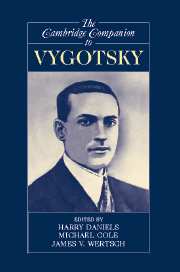Book contents
- Frontmatter
- Editors’ Introduction
- Part I: Vygotsky in Context
- 1 Vygotsky in Context: 1900-1935
- 2 Vygotsky’s Demons
- 3 An Interesting Resemblance: Vygotsky, Mead, and American Pragmatism
- 4 Vygotsky, Mead, and the New Sociocultural Studies of Identity
- 5 Vygotsky on Thinking and Speaking
- Part II: Readings of Vygotsky
- Part III: Applications of Vygotsky’s Work
- References
- Index
3 - An Interesting Resemblance: Vygotsky, Mead, and American Pragmatism
from Part I: - Vygotsky in Context
Published online by Cambridge University Press: 28 November 2007
- Frontmatter
- Editors’ Introduction
- Part I: Vygotsky in Context
- 1 Vygotsky in Context: 1900-1935
- 2 Vygotsky’s Demons
- 3 An Interesting Resemblance: Vygotsky, Mead, and American Pragmatism
- 4 Vygotsky, Mead, and the New Sociocultural Studies of Identity
- 5 Vygotsky on Thinking and Speaking
- Part II: Readings of Vygotsky
- Part III: Applications of Vygotsky’s Work
- References
- Index
Summary
Vygotsky is an original. It is a disservice to him to either find his significance solely in developing Soviet conceptions of man or to render him by gloss translation into language of functionalism or to see only his kinship to George Herbert Mead, to whom he has an interesting resemblance.
(Bruner, 1962, p. vi)INTRODUCTION
Bruner's description of Vygotsky in his introduction to Thought and Language sets out the challenge to be faced when examining his work alongside that of Mead and of James, Peirce, and Dewey. Vygotsky's unique genius is beyond dispute and Bruner was right to warn against a seductive assimilation of his ideas into the prevailing schema of Western social science. Neither, I would suggest, that Vygotsky's work be tested according to the pragmatic principle of its use to a particular field of study.
Therefore, in this chapter there will be some resistance to assimilation by association and to judgments of utility. I will focus on Vygotsky and Mead, separately, as distinct contributors to enduring schools of thought that have much in common but which have developed quite differently. The comparison will, ultimately, lend support to the premise so central to the reflexive form of social science that both espoused: that ideas and, therefore, minds are socially formed and shape the ways in which we act in and on the world.
- Type
- Chapter
- Information
- The Cambridge Companion to Vygotsky , pp. 77 - 100Publisher: Cambridge University PressPrint publication year: 2007
- 15
- Cited by



